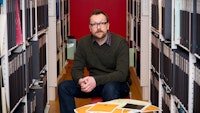Field of study: Artistic Research (vocal)
Elisabeth Holmertz: The Otherness of the self

In this artistic PhD project, singer Elisabeth Holmertz looks into the meaning of "role": what a role is, what it becomes and what it does with her as a singer and performer when she goes into different personalities and characters.
Summary
Aim
This is a research project with many aspects. However, Holmertz's main goal is to shed new light on a field which has been somewhat locked in the traditions by large institutions where the sound of the voice has been more important than the acting.
Material - Monteverdi's L'Orfeo
Holmertz has created a performance of the opera L'Orfeo (Claudio Monteverdi) where she sings all the parts herself. In addition composer Henrik Hellstenius and Holmertz work on a new opera together where she mirrors the experiences she makes with L'Orfeo.
The work with these operas is both a goal and a tool to work on what roles mean to her and how she can convey this to others.
New knowledge
Many of the 17th-century opera singers came from Commedia dell'arte and were actors who sang, more than singers who acted. They often took on more than one role in each performance, sometimes switching in the course of seconds. What did it do to their singing when the improvised theatre was a strong foundation for the newly invented opera? This is an exciting angle in early opera research that needs more attention.
In contemporary music theatre, it is an established form to work with different aspects of the body and voice. How can Holmertz use this knowledge for singing baroque opera and vice versa?
Holmertz wishes to create new tools on how to work on performance practice, in both early and contemporary music theatre.
Documentation
The full title of the project is The Otherness of the Self. How to curate a Seventeenth-century Opera and sing all the Roles yourself.
Articles relevant
Published: Oct 18, 2016 — Last updated: Nov 19, 2025



